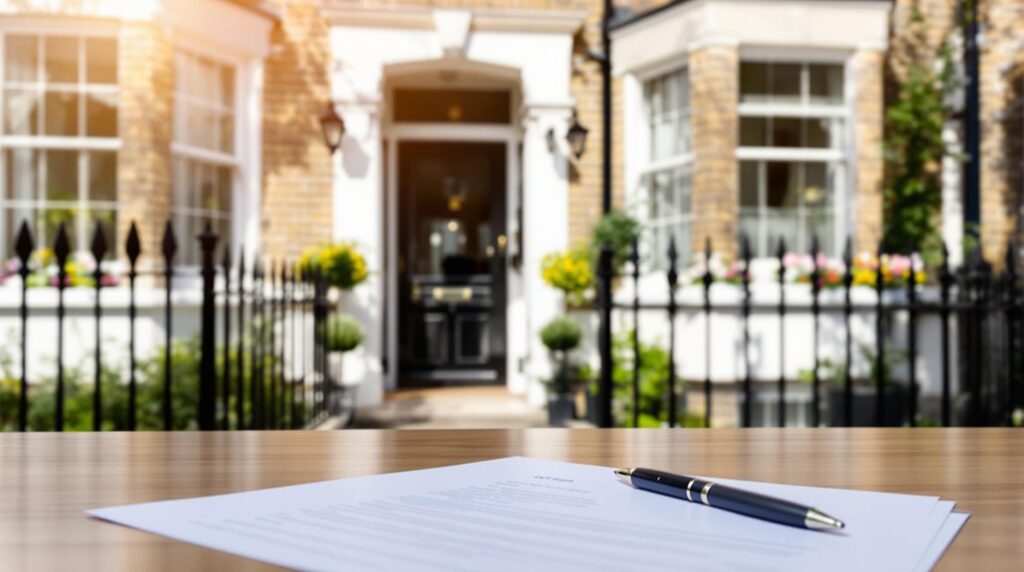I’ll walk you through the complexities of leasehold conveyancing because buying a flat in the UK isn’t like purchasing a house. You’re not just buying the property—you’re acquiring a lease with specific terms, obligations, and potential complications that can catch you off guard. The process involves unique legal documents, ongoing financial commitments, and intricate relationships with freeholders and management companies that require specialized expertise to navigate successfully.
Key Takeaways
- Leasehold purchases take 12-16 weeks compared to 8-10 weeks for freehold due to additional documentation requirements.
- Specialized conveyancers review lease terms, assess length implications, and conduct management company searches for leasehold-specific risks.
- Essential documents include original lease, financial records, service charge statements, and property compliance certificates before completion.
- Service charges must be reasonable under law and can be challenged through First-tier Tribunal if excessive.
- Early identification of missing rights, management pack delays, and title disputes prevents transaction collapse and legal complications.
What Makes Leasehold Property Different From Freehold Ownership

When you’re buying property in the UK, you’ll encounter two fundamental types of ownership that shape everything from your monthly expenses to your long-term investment potential.
With freehold ownership, you own both the property and the land beneath it indefinitely. You’ll have complete control over modifications, no ground rent obligations, and full autonomy over your investment decisions.
Leasehold ownership means you’re purchasing the property for a fixed term—typically 99 to 999 years—but someone else owns the land. You’ll face ongoing service charges, ground rent payments, and need written permission for alterations. Most flats operate under leasehold arrangements. Additionally, leaseholders inherit the remaining lease term upon purchase, which continues to reduce with each transfer of ownership. This can lead to complications such as leasehold complexities, especially if the lease term becomes significantly shorter.
The key difference? Freehold gives you independence, while leasehold creates an ongoing relationship with your freeholder that affects both costs and control.
Essential Timeline and Stages of Your Leasehold Purchase
Unlike freehold purchases that follow a straightforward path, your leasehold transaction involves additional complexities that’ll extend both timeline and legal scrutiny. You’re looking at 12-16 weeks on average, compared to 8-10 weeks for chain-free freehold deals.
I’ll walk you through the essential stages: First, you’ll appoint your conveyancer and secure mortgage agreement in principle. Next comes documentation review—your solicitor analyzes lease terms, orders property searches, and reviews the leasehold management pack. This step is crucial as it ensures that all necessary legal documentation is in order before proceeding. Then you’ll finalize your mortgage offer and sign contracts.
Pre-completion involves agreeing completion dates and conducting final searches before exchanging contracts. You’ll also need to understand any ground rent and service charge obligations that come with your leasehold property. Finally, completion transfers ownership while your conveyancer handles SDLT and Land Registry registration. Defective leases can push timelines to six months, so preparation matters.
Why Your Conveyancer Is Critical to Leasehold Success

While standard property purchases require basic legal oversight, leasehold transactions demand specialized expertise that only an experienced conveyancer can provide. I’ll scrutinize your lease terms, identifying restrictive clauses that could impact your property use and future alterations. I’ll assess lease length implications for both property value and mortgage eligibility, while reviewing ground rent clauses to prevent unexpected financial burdens. Additionally, I’ll ensure you understand the legal and customary aspects of survey sharing, which can impact your negotiations with the seller.
I’ll conduct specialized searches into your management company’s history, checking for disputes or arrears that could signal trouble ahead. I’ll coordinate with freeholders and managing agents, serving statutory notices to protect your interests when third parties delay responses. The Leasehold Information Pack provides crucial details about service charges and ground rent that require expert analysis to avoid costly surprises.
Most importantly, I’ll mitigate leasehold-specific risks by advising on lease extensions, escalating service charges, and compliance requirements that could lead to forfeiture if overlooked.
Must-Have Documents for Every Leasehold Transaction
Your conveyancer’s expertise means nothing without the proper documentation in hand. I’ll walk you through the essential papers that make or break leasehold transactions.
You’ll need your original lease agreement, extension paperwork, and share certificates for shared freehold properties. Don’t forget title registers and ownership proof. Financial records are equally critical—ground rent demands, service charge statements, sinking fund details, and payment histories must be current. It’s important to also verify lease length to avoid potential pitfalls.
Property compliance documentation includes structural work guarantees, planning permissions, building regulation certificates, and fire risk assessments. Your management company should provide LPE1 information packs, freeholder contacts, insurance policies, and financial accounts.
Finally, you’ll complete TA7 leasehold forms, TA10 fittings forms, and property information documents. The conveyancer must also notify the landlord or management company of the ownership change following completion. Missing any of these creates delays that’ll frustrate everyone involved.
Common Pitfalls That Can Derail Your Purchase

Even with perfect documentation, leasehold transactions collapse when fundamental defects surface during conveyancing. I’ve seen buyers devastated when their lease lacks essential rights for parking or communal areas, making the property virtually unusable. Defective ground rent provisions can trap you with escalating costs that weren’t apparent initially.
Management pack delays are transaction killers. When freeholders drag their feet providing service charge histories or insurance details, your purchase timeline extends by weeks. Missing financial records make it impossible to assess future liabilities accurately. Additionally, understanding local planning regulations can help prevent potential issues that may arise during the purchase process.
Title disputes and missing planning permissions create legal nightmares requiring costly resolution. Your mortgage offer might be withdrawn if lenders discover lease defects or undisclosed major works. Early identification of these complications allows for informed decision-making and prevents transaction delays. Don’t let inadequate due diligence derail your investment—these pitfalls are preventable with proper legal scrutiny.
Smart Strategies to Streamline Your Leasehold Conveyancing
How can you transform sluggish leasehold conveyancing into a streamlined process that protects your investment?
I’ll leverage the Leasehold and Freehold Reform Act 2024’s game-changing provisions to accelerate your purchase. You can now bypass the two-year ownership requirement for immediate lease extensions and exploit the removal of 12-month restrictions on repeat claims. Understanding leasehold agreements can help you navigate potential renovation challenges.
I recommend serving Section 42 Notices immediately after confirming freeholder details through Land Registry‘s £7 online service. This establishes your fixed valuation date upfront. We’ll engage specialist solicitors for legally compliant notice drafting while preparing for Section 45 Counter-Notice scenarios through pre-negotiated premium terms.
Digital platforms will accelerate our timeline—real-time document sharing, automated tracking, and e-signature tools eliminate postal delays. I’ll initiate pre-notice discussions with freeholders to align premium expectations, reducing disputes before they escalate. The introduction of mandatory professional qualifications for managing agents will ensure higher standards of service throughout the conveyancing process.
Understanding Lease Terms and Mortgage Requirements

Since mortgage lenders scrutinize lease terms with mathematical precision, I’ll decode the critical thresholds that determine whether your application succeeds or fails.
Barclays requires 70 years remaining at mortgage start, while most lenders reject properties below 40 years due to valuation risks. You’ll need your lease extending 40+ years beyond your loan term to meet lender criteria.
Here’s what you must understand: leases below 70 years trigger steep valuation declines, making lenders nervous. Once terms drop below 80 years, extension premiums spike dramatically due to marriage value calculations. It’s essential to be aware of ground rent increases that can impact your overall affordability.
I recommend extending leases before they hit 80 years to avoid these costs. If you’re dealing with absent freeholders, indemnity policies can bridge approval gaps. The 2024 reforms bringing 990-year extensions will transform this landscape entirely.
When remortgaging leasehold properties, freeholders must be informed about your plans as part of the legal requirements.
Managing Service Charges and Ground Rent Obligations
Three fundamental obligations shape your leasehold ownership: service charges, ground rent, and major works contributions. I’ll help you navigate these costs effectively.
Your service charges must be reasonably incurred under the Landlord and Tenant Act 1985. You can challenge unreasonable charges through the First-tier Tribunal, and recent reforms extend these protections to fixed-service-charge payers too. Demand transparency – your freeholder must provide detailed annual accounting reports and proper service charge demands including their name and your rights summary. You now have the right to request detailed information supporting service charge demands, including contracts, invoices, and receipts. Be mindful that long-term leases can lead to escalating ground rents, which may significantly impact your financial obligations over time.
Insurance costs are now capped at actual premiums plus genuine handling fees, with landlord commissions abolished. Your service charge funds are held “on trust,” protecting you from landlord insolvency.
Remember: non-compliant demands give you legal grounds to withhold payment until proper documentation arrives.
Conclusion
I’ve covered the technical essentials you’ll need for successful leasehold conveyancing. You’ll face complex documentation, strict timelines, and multiple compliance requirements that demand specialist expertise. Don’t underestimate the importance of appointing an experienced leasehold conveyancer who’ll identify potential issues before they become costly problems. With proper preparation and professional guidance, you’ll navigate the 12-16 week process efficiently and secure your flat purchase with confidence in your investment decision.
References
- https://hoa.org.uk/advice/guides-for-homeowners/i-am-buying/leasehold-conveyancing/
- https://www.netlawman.co.uk/ia/leasehold-conveyancing
- https://www.comparemymove.com/guides/conveyancing/leasehold-solicitors
- https://www.talbotslaw.co.uk/site/purchasing-a-property-the-conveyancing-process/
- https://www.birdandco.co.uk/site/blog/conveyancing-blog/the-uk-conveyancing-process-flowcart
- https://www.dflegal.com/the-difference-between-freehold-and-leasehold-property/
- https://hoa.org.uk/advice/guides-for-homeowners/i-am-buying/leasehold-v-freehold-whats-the-difference/
- https://www.nerdwallet.com/uk/mortgages/freehold-vs-leasehold-differences/
- https://www.unbiased.co.uk/discover/mortgages-property/ownership-improvements/leasehold-vs-freehold-what-s-the-difference
- https://www.halifax.co.uk/mortgages/help-and-advice/freehold-vs-leasehold.html

